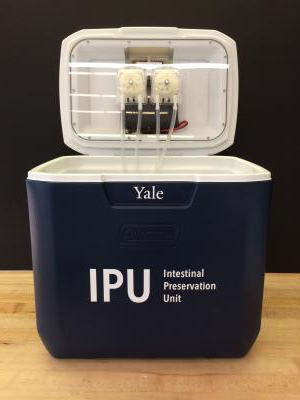Organ Transporting Technology Developed At CEID, Presented at YEI Demo Day
Every year, there are more than 15,000 cases of severe intestinal failure. Even though there are thousands of donor grafts, doctors perform fewer than 140 intestinal transplants.
That has a lot to do with the ineffective methods of transporting intestines, which quickly degrade due to the amount of bacteria they contain. The standard means of transporting intestines is by storing it in an ice-filled cooler.
Revai, a company made up of Yale students and faculty from the School of Engineering & Applied Science and the School of Medicine, has a better way. The two student founders, Jennifer Gaze (SOM ’16) and Jesse Rich (SOM ’16) made their pitch this week at the Yale Entrepreneurial Institute’s Demo Day. Revai was one of 11 companies making presentations.
 The company’s Intestinal Preservation Unit (IPU) was developed at the Center for Engineering Innovation & Design in a course on medical device design. Joseph Zinter, Associate Research Scientist & Lecture and a co-inventor of the device, teaches the course.
The company’s Intestinal Preservation Unit (IPU) was developed at the Center for Engineering Innovation & Design in a course on medical device design. Joseph Zinter, Associate Research Scientist & Lecture and a co-inventor of the device, teaches the course.
Work on the IPU began when Dr. John Geibel, Professor of Surgery (Gastrointestinal) at the Yale School of Medicine, came to Zinter seeking a better way to transport intestines.
Rather than just storing the organ, the device pumps fluid through the intestine to prevent it from degrading during transportation.
“We’re effectively expanding the donor network throughout the entire United States,” Rich said at the presentation.
The company has already conducted tests on intestine samples from both pigs and humans. Results have consistently shown that the samples stored in the IPU showed now change in quality over eight hours, while those stored in the standard cooler show degradation over the same time period. Zinter said they will continue to conduct tests to explore optimal transport conditions.
Rich and Gaze said at the presentation that they expect the company will have a product on the market by 2018.

